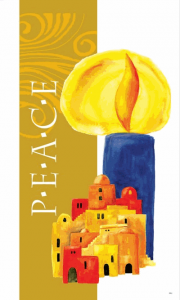| Texto en español | Text auf Deutsch |

Thoughts to the first Sunday of Advent
Our world is full of small and large armed conflicts that cost thousands of people their lives or their physical and mental integrity. It is simply inconceivable that we humans learn nothing from our history.
In connection to this, you could consider the verse from Mat 5,39: “When someone strikes you on your right cheek, turn the other one to him as well.” A wisdom, which irritates us immediately. Why do I have to suffer the hurt twice and become humiliated to get peace? – Not a few will ask what is that good for. It is no different than a wisdom that the ancient Greeks had already recognized, namely that of amnesty. There it was prescribed by law and executed in all its consequences. What does that mean?
What has happened cannot be undone, and we all know this from often painful experiences. The call and desire for revenge, retribution, and (supposed) justice is strong. But how can one succeed in escaping this spiral of mistreatment, murder, manslaughter, and ongoing mutual violence? It is a dilemma that has plagued human history for thousands of years and we see the best example of this in the events in the Middle East. War and suffering only lead to new war and suffering.
In ancient Greece, it was recognized that a new, untouched page must be opened in the Book of Life. However, this can only happen if all the old “insulting and hurting” do not continue to burden. Therefore “general forgetting” – the amnesty, was prescribed by law. The violation or disregard of this law was made under penalty of death or synonymous exclusion from the society (outlaw = was left to fend for itself), the highest of all penalties. Thus, amnesty can be seen as a kind of prescriptive forgetting. This requires tremendous courage from people in terms of size and tolerance. This is often not easy. But only through this pain a new beginning succeed, and a new, common life possible.
The Christian faith understands itself as a religion of peace. But what a contradiction do we see and read in the daily news?
Today we celebrate the first Sunday of Advent. This should recall the entry of Jesus into Jerusalem. (Luke 21,25–28.34–36). This report on this triumphal entry is a contrast program. But these contrasts show us examples for use in one’s own life. It is the story of a king who comes as a low servant on a donkey, not in royal robes, but in clothes of the poor and the humble. Jesus Christ does not come as an earthly king to conquer by force but with love, grace, mercy, and sacrifice for his people. His kingdom on earth has no armies, riches, or splendor, but humility and servanthood. He does not conquer nations or markets; he does not want to dominate anyone. No, he invites and speaks to the hearts of the people, His message is that of peace.
Every peace always starts on a small scale, in ourselves, no matter what the external circumstances may be. Every peace begins or ends where the boundaries between me and my neighbor are crossed. If there is disunity within ourselves, it usually reflects outward in our words and actions. Sooner or later, this inner “war” leads to external strife. That’s why it’s so important to be at peace with yourself, “to function smoothly”. I cannot ask for something from others that I am not prepared to give from myself.
The essential step to inner peace is forgiveness. Only by forgiving others and oneself can the negative emotions be overcome. This does not say the acts or incidents were alright. Sometimes only the prescribed forgetting helps here. Then it becomes clear, what Jesus had meant with, “When someone strikes you on your right cheek, turn the other one to him as well.” This can’t work without pain. It’s a tough struggle, but it works if both sides have a genuine interest in it. Peace begins in small steps and gestures. Great empathy and creativity are needed to resolve conflicts, as well as other, non-violent methods. It is a long learning process and requires emotional maturity. Let’s set off together on the road to a common peace on this first Sunday of Advent …
In this sense:
Shalom aleikhem – as-salãmu ʿalaykum –
peace be upon you –
La paz sea contigo –
Pokój z toba –
La paix soit avec vous –
a paz esteja contigo –
Friede sei mit Dir …!
Christian
Latest posts by Christian (Posts)
- Holy Saturday – Sábado Santo - 29/03/2024
- Good Friday – Viernes Santo - 28/03/2024
- Maundy Thursday – Jueves Santo - 27/03/2024



